|
|
|
Sort Order |
|
|
|
Items / Page
|
|
|
|
|
|
|
| Srl | Item |
| 1 |
ID:
150993


|
|
|
|
|
| Summary/Abstract |
The goal of the current research was to examine how discrete positive intergroup emotional phenomena affect conflict-related attitudes in different contexts of intractable conflict. We hypothesized that empathy, but not hope would be negatively associated with aggressive attitudes during escalation, while hope, but not empathy would be associated with conciliatory attitudes during de-escalation. In study 1, we examined our hypotheses within a correlational design in an emotion-inducing context, while in study 2 a two-wave survey was conducted during real-life events within the context of the Israeli–Palestinian conflict; a peace summit as well as a war. Both studies supported our hypotheses, thus indicating the unique, yet complimentary, contribution of each of the two emotional phenomena to the advancement of peace.
|
|
|
|
|
|
|
|
|
|
|
|
|
|
|
|
| 2 |
ID:
087730
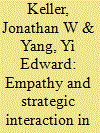

|
|
|
|
|
| Publication |
2009.
|
| Summary/Abstract |
Empirical evidence supports the poliheuristic (PH) theory of decision making, which states that leaders typically employ a two-stage non-compensatory decision-making process. In stage one leaders reject options that do not meet some minimum criteria of acceptability on one or more dimensions, and in stage two they choose among the remaining options using a more rational utility-maximizing rule. While PH theory has primarily been applied at the monadic level, to explain the process and content of states' decisions, we contend it has important implications for strategic interaction and can help to explain outcomes in world politics. Specifically, we argue that a crucial variable shaping crisis outcomes is the degree to which leaders' non compensatory decision criteria in stage one include options' acceptability to the opponent. When leaders empathize with their opponent and screen out those options the opponent considers unacceptable, crises will be resolved more quickly and with a lower likelihood of escalation. Empathy introduced during the second, utility-maximizing stage, may also dampen conflict but is less effective than stage one empathy. We illustrate this dyadic non compensatory model by examining two cases involving the U.S.-China and U.S.-Iraq bilateral relationships.
|
|
|
|
|
|
|
|
|
|
|
|
|
|
|
|
| 3 |
ID:
167548
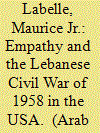

|
|
|
|
|
| Summary/Abstract |
This article examines the role that empathy played during the US intervention in the Lebanese civil war of 1958, also known as Operation Blue Bat. Through deep readings of public texts, it explores how a minority of Americans empathized with Lebanese opponents of President Camille Chamoun. After the arrival of US forces, Lebanese anti-Chamounists made their voices heard and feeling felt in the USA via global information providers, enacting cultural interventions. Lebanese dissent was headline news, engendering empathetic processes that reoriented US ways of feeling, thinking, and acting. By using empathy as a point of entry into historical intercultural relations, this article unearths how genuine transnational understandings were socially formed during a moment of conflict. Ultimately, it argues that a focus on empathy gives foreign relations scholars an avenue that eschews nefarious Orientalist binaries and their powers in the process.
|
|
|
|
|
|
|
|
|
|
|
|
|
|
|
|
| 4 |
ID:
165448
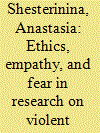

|
|
|
|
|
| Summary/Abstract |
The discussion of ethics in the social sciences focuses on ‘doing no harm’ and ‘giving back’ to research participants, but does not explore the challenges of empathy and fear in research with participants in political violence and war. Drawing on 180 in-depth interviews on the Georgian–Abkhaz war of 1992–93 collected over eight months between 2010 and 2013 primarily in Abkhazia, but also Georgia and Russia, I argue that researchers can come to empathize with some but fear other participants in past and present violence. These emotional responses can influence researchers’ ability to probe and interpret interviews and respondents’ ability to surpass strong positions to explore dilemmas of participation in violence. By empathizing with not only ‘victims’ and ‘non-fighters’ as I had expected based on my pre-existing moral-conceptual categories, but also participants in the war, I found that individuals adopted multiple overlapping roles and shifted between these roles in the changing conditions of violence. In contrast, failing to empathize with and fearing those who continued to participate in violence after the war of 1992–93 limited my ability to fully appreciate the complexity of their participation, but shed light on the context of violence in contemporary Abkhazia. This analysis shows that reflection on the role of empathy and fear in shaping our interactions with research participants can help advance our understanding of participation in violence and this difficult research context.
|
|
|
|
|
|
|
|
|
|
|
|
|
|
|
|
| 5 |
ID:
175294
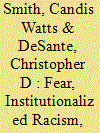

|
|
|
|
|
| Summary/Abstract |
For nearly 75 years, scholars of American public opinion have sought to measure whites’ attitudes toward blacks: social scientists have invented and revised ways to measure what we could refer to as “racial prejudice.” With each revision, scholars who believe they have captured new forms of racial animus are met with opposition from those who believe that old-fashioned anti-black affect is a thing of the past. We directly answer these claims by collecting a surfeit of attitudinal measures to simultaneously estimate the relationship between cognitive beliefs about the racial status quo and emotional reactions to racism. First, we uncover that two higher-order dimensions undergird whites’ racial attitudes. Second, we validate a four-item version of our new battery using the 2016 Cooperative Congressional Election Study.
|
|
|
|
|
|
|
|
|
|
|
|
|
|
|
|
| 6 |
ID:
161597
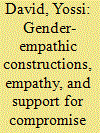

|
|
|
|
|
| Summary/Abstract |
The goal of the present study was to investigate how empathy and gender-empathic constructions affect the levels of support for political compromise in an intractable conflict. Gender-empathic constructions relate to perceptions that individuals hold about self or others as having feminine-empathic gender traits. We hypothesized that empathy will be positively associated with support for compromise, but that perceiving one’s own group as feminine empathic will be negatively associated with such attitudes, with empathy being a significant mediator. Data were collected through a public opinion survey conducted with a representative sample of Israeli-Jewish adults (N = 511). The findings supported our hypotheses, thus indicating that perceiving one’s own group as having feminine-empathic traits and empathy toward opponents made significant contributions to explaining Jewish-Israeli willingness to compromise with Palestinians. The implications of our findings for understanding the role of gender-empathic constructions and of empathy in conflict resolution are discussed.
|
|
|
|
|
|
|
|
|
|
|
|
|
|
|
|
| 7 |
ID:
186873


|
|
|
|
|
| Summary/Abstract |
Understanding the reasoning behind diverse views grows empathy and can help strengthen democracy. This study examines narratives and their influence on individuals, to see if individuals only empathize with narratives from those with whom they share identity. Using an experimental design, we test empathy with working class climate change narratives. Results showed participants who agreed with anthropogenic climate change, who were given both evidence and a narrative, empathized with the narrator (either an organic farmer or a mechanic) that told a pro-climate change narrative. The greatest empathy was for the mechanic telling a pro-climate change narrative. Conversely, participants who did not agree with human-caused climate change and who were given evidence without narrative had more empathy for the organic farmer (over the mechanic) who told a pro-climate change narrative. Overall, we found some identity issues negatively influenced empathy, but we also found examples where individuals moved beyond their identity.
|
|
|
|
|
|
|
|
|
|
|
|
|
|
|
|
| 8 |
ID:
193991


|
|
|
|
|
| Summary/Abstract |
One of the most demanding challenges teachers and educators face is the need to engage their students with ‘difficult knowledge’ topics. The need to unwrap controversial issues that are the subject of cultural or historical debate, without oversimplifying them, making them accessible and their morals apparent, all while committing them to memory, is an ongoing challenge for most pedagogical approaches. How to teach difficult knowledge in the classroom, especially the topic of the Holocaust, is a question that all educators in Israel face during their career. A common teaching tool is the use of film in both first and third-person narrative. Focused on the effect of narrative perspective in the teaching of difficult knowledge, this article examines the effect of first-person and third-person narrative in film on both short- and long-term memory among a cohort of students enrolled at a college of education in Israel. It also seeks to provide news insights into this issue by looking at the connection between empathy, previous knowledge, and perspective taking.
|
|
|
|
|
|
|
|
|
|
|
|
|
|
|
|
| 9 |
ID:
076500
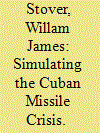

|
|
|
|
|
| Publication |
2007.
|
| Summary/Abstract |
The Cold War is now ancient history to most university students. They can learn the facts of this period, but the feelings associated with the experience are beyond the scope of social science. Such feelings should be part of teaching and learning about international studies. Instructors can present history and politics, but without an emotional sense of empathy, students will never fully understand the subtle complexity of international affairs. They must be able to view the world from different perspectives, participating in the values, feelings, and perceptions of others. This study describes a computer simulation that allows students to participate in the emotional affect of the Cold War, developing a sense of empathy with decision makers. Part one presents a literature survey and discusses the need for control groups and research replication. Part two describes the simulation. Part three evaluates the results on student learning. A conclusion introduces a means by which instructors can replicate the simulation experience.
|
|
|
|
|
|
|
|
|
|
|
|
|
|
|
|
| 10 |
ID:
194815


|
|
|
|
|
| Summary/Abstract |
This present research explores a progressive repurposing of Virtual Reality technology, Virtual Immersive Contact (VIC), in a real-world setting to; explore viability to reduce prejudice and investigate the role of empathy in motivating prosocial behavior. The study employed a between-subjects repeated-measures experimental design of a randomized sample (n = 113) split into two conditions to reduce prejudice and discrimination in the active conflict area of the Central African Republic (CAR). In line with the study’s hypotheses, VIC produced a significant increase in empathic concern for the Muslim outgroup and intentions to donate to a Muslim family, while also showing that the relationship between empathy and helping behaviours was mostly explained by confounding variables. This research provides both the first evidence of its kind that VIC could be a new form of fostering positive intergroup contact in an active conflict setting, crating a new facet of intergroup contact theory, and further evolving the literature on the empathy, prosocial behaviour relationship.
|
|
|
|
|
|
|
|
|
|
|
|
|
|
|
|
|
|
|
|
|